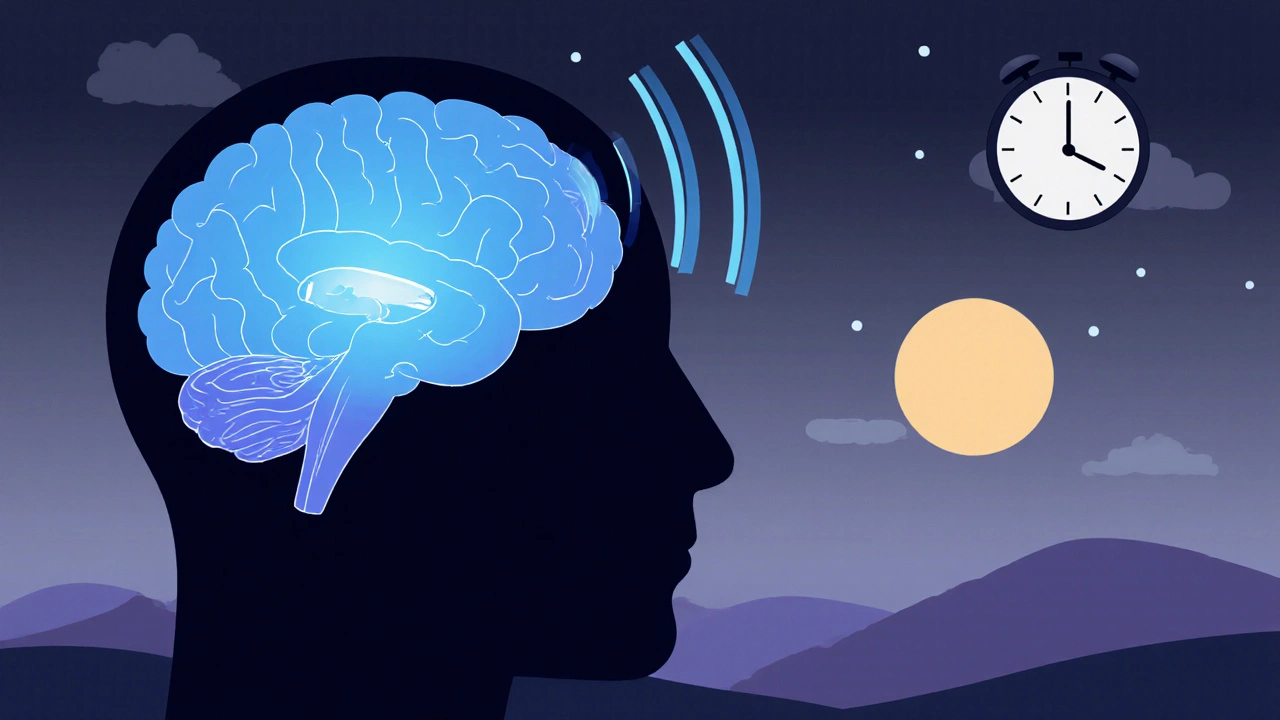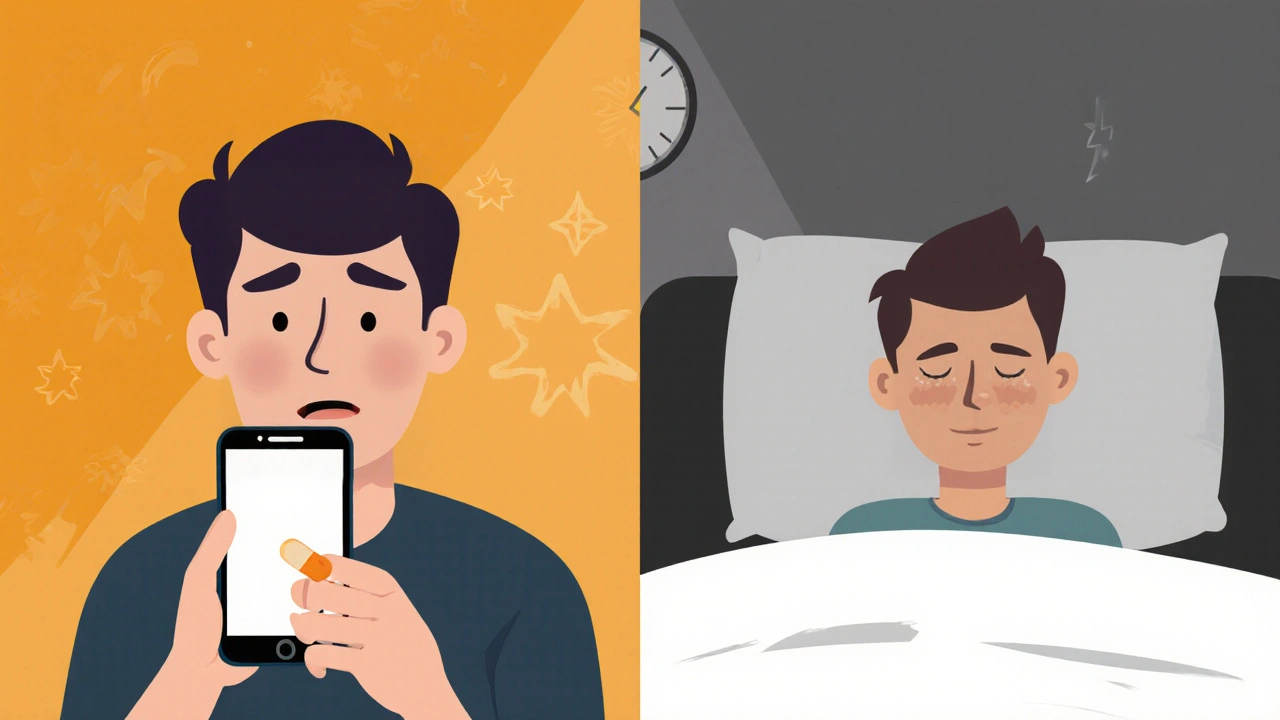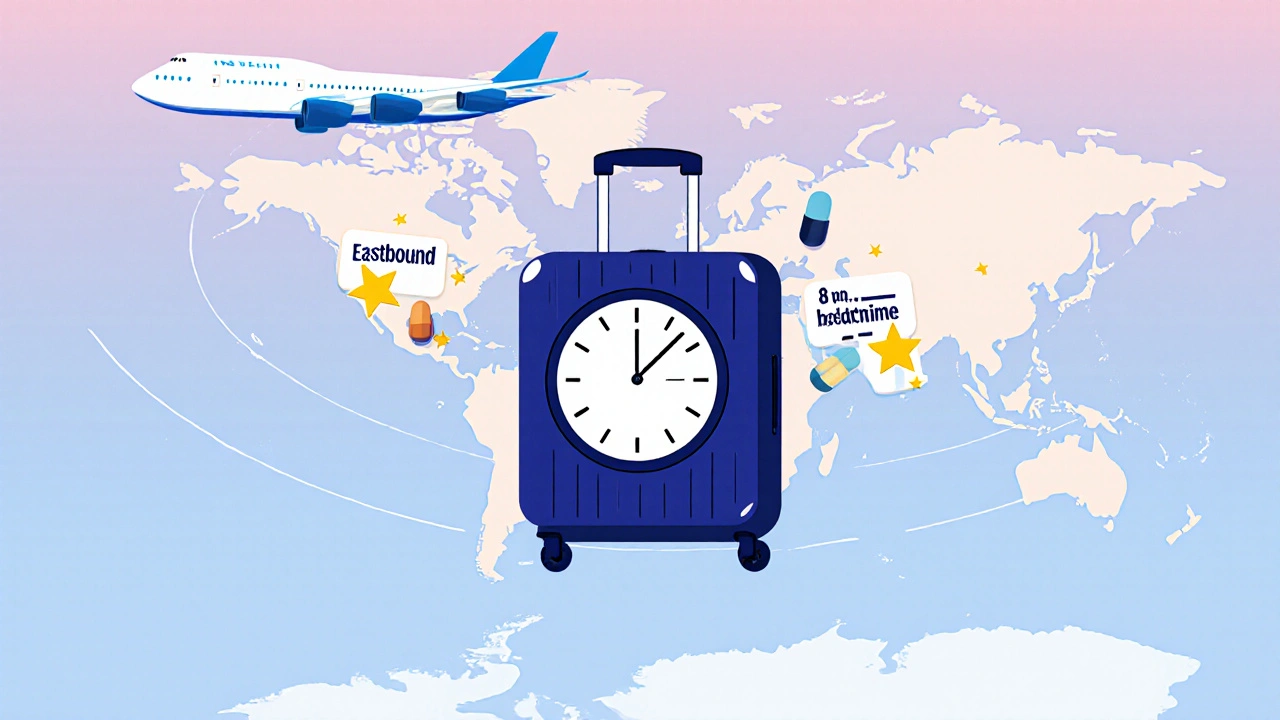Melatonin: How Natural Sleep Hormone Supplements Really Work
 Nov, 20 2025
Nov, 20 2025
Most people think melatonin is a sleeping pill. It’s not. It’s your body’s natural melatonin signal - a hormone that tells your brain it’s time to wind down. When the sun goes down, your pineal gland starts pumping out melatonin. Levels rise around 9 or 10 p.m., peak in the early hours of the morning, and drop before sunrise. This isn’t magic. It’s biology. But when you take it as a supplement, timing and dose matter more than you think.
How Melatonin Actually Works
Melatonin doesn’t knock you out like Ambien or Lunesta. Those drugs boost GABA, a calming brain chemical, to force sleep. Melatonin works differently. It binds to receptors in your brain’s master clock - the suprachiasmatic nucleus - and says, ‘It’s dark. Time to prepare for sleep.’
This triggers two key changes: your core body temperature drops by about half a degree Celsius, and your brain shifts into nighttime mode. You don’t instantly fall asleep. You just feel ready. That’s why taking melatonin at 11 p.m. when you normally sleep won’t help much. But taking it at 7 p.m. if you’re trying to shift your schedule? That’s when it works.
There are two main receptor types: MT1 and MT2. MT1 makes you sleepy right away. MT2 adjusts your internal clock. That’s why melatonin helps with jet lag and shift work - it doesn’t just make you tired. It resets your rhythm.
What Melatonin Actually Does Well
If you’ve just flown from New York to Tokyo and your body thinks it’s 3 a.m. but you need to sleep at 10 p.m. local time, melatonin can cut your adjustment time from five days to two. Studies show it helps eastward jet lag more than westward. That’s because going east means you’re trying to fall asleep earlier than your body wants - and melatonin pushes your clock forward.
Same goes for delayed sleep phase syndrome. People with DSPS don’t feel tired until 2 a.m. or later. They can’t wake up early. Taking 0.5 mg of melatonin 2-3 hours before their desired bedtime - say, 7 p.m. if they want to sleep by 11 p.m. - can shift their rhythm by up to an hour and a half over a few weeks. One Reddit user wrote: ‘Took 0.5 mg at 9 p.m. every night. In three weeks, I was falling asleep at 11 p.m. without effort.’
For shift workers - nurses, truck drivers, warehouse staff - melatonin can help sync sleep with odd hours. The American Academy of Sleep Medicine gives it a conditional recommendation for DSPS and jet lag. For general insomnia? Not so much. If your problem is waking up at 3 a.m. and can’t go back to sleep, melatonin won’t fix that. It’s not a sleep maintainer.
Why Most People Get It Wrong
The biggest mistake? Taking too much.
Most supplements in the U.S. sell 3 mg, 5 mg, even 10 mg. But your body naturally produces less than 0.3 mg. Studies show doses above 0.5 mg don’t improve sleep - they just increase side effects. Vivid dreams, headaches, next-day grogginess - those are common at higher doses.
Another mistake? Taking it too late. If you pop a pill at midnight, you’re not helping your body sleep. You’re confusing it. Melatonin taken after your natural peak can delay your rhythm instead of advancing it. So if you’re trying to sleep earlier, but take it at 11 p.m., you might end up sleeping even later.
And then there’s the timing mismatch. People take it after dinner, after scrolling on their phone, after bright lights. But light - especially blue light from screens - shuts down melatonin production. Taking a supplement while staring at a tablet? You’re fighting your own biology.

What the Research Says About Effectiveness
A 2013 Cochrane review of 19 studies found melatonin reduced how long it took to fall asleep by about 7 minutes on average. That’s not huge. Prescription sleep meds knock off 20-30 minutes. But melatonin’s real value isn’t in speed - it’s in timing.
For circadian disorders, the numbers are stronger. One meta-analysis showed melatonin advanced sleep onset by 40 minutes and shifted the body’s natural melatonin release by over an hour. That’s meaningful. Especially if you’re a night owl trying to become a morning person.
But here’s the catch: results vary wildly. Why? Because studies use different doses, different times, different people. Some use 0.3 mg. Others use 10 mg. Some give it at 8 p.m. Others at 10 p.m. No wonder results are mixed.
Dr. Neil Stanley, a UK sleep expert, put it bluntly: ‘Many people take melatonin at the wrong time or wrong dose, rendering it ineffective.’
The Supplement Problem
Melatonin is sold as a dietary supplement in the U.S. That means the FDA doesn’t test it for purity, potency, or accuracy. A 2022 ConsumerLab analysis found melatonin content in supplements ranged from 83% to 478% of what was on the label. One pill labeled 3 mg had 14 mg. Another had only 0.7 mg.
That’s dangerous. You think you’re taking 1 mg. You’re actually taking 5. You wake up groggy. You take more. You get a headache. You think melatonin doesn’t work. It’s not the hormone. It’s the product.
In the UK and parts of Europe, melatonin is a prescription drug. Only one formulation - Circadin, a 2 mg slow-release version - is approved for insomnia in people over 55. That’s because they control the quality. In the U.S., you’re gambling.

How to Use It Right
Here’s what actually works, based on research and real-world use:
- Start with 0.3 mg to 0.5 mg. That’s enough to signal your brain. More doesn’t help.
- Take it 2-3 hours before your target bedtime. If you want to sleep at 11 p.m., take it at 8 p.m.
- Dim the lights 30-60 minutes before taking it. No screens. No bright overhead lights.
- For jet lag (eastbound): Take it at local bedtime for 2-3 days before travel and after arrival.
- For jet lag (westbound): Take it at local bedtime after arrival. No need to start early.
- Don’t use it every night. Try 3-5 nights a week, especially during travel or schedule changes.
If you don’t see results after a week, you’re probably taking it too late or too much. Stop. Reset. Try again with less.
Who Should Avoid It
Melatonin isn’t for everyone.
If you’re pregnant or breastfeeding, skip it. The data is too thin. If you have autoimmune diseases, depression, or epilepsy, talk to a doctor first. Melatonin can interact with blood thinners, diabetes meds, and immunosuppressants.
And if you’re under 18? Don’t use it without medical supervision. Kids’ circadian systems are still developing. Long-term effects aren’t well studied.
Even healthy adults can develop tolerance. About 40% of regular users on Reddit reported melatonin stopped working after 4-8 weeks. That doesn’t mean your body ‘got used to it.’ It might mean you’re taking too much, or your timing is off. Try skipping it for a week, then restart with 0.3 mg.
The Future of Melatonin
Scientists aren’t done with melatonin. New drugs like agomelatine and tasimelteon are designed to target only the receptors that reset your clock - without the drowsiness. These could help with depression, Alzheimer’s-related sleep issues, and even post-COVID fatigue.
Right now, melatonin is a blunt tool. But the future? Precision timing. Personalized doses. Blood tests to measure your natural melatonin rise. Stanford’s Dr. Jamie Zeitzer says we’re moving from ‘sleep aid’ to ‘circadian regulator.’
That means one day, you might not need to guess your dose. You’ll get a test. A recommendation. A plan.
Until then, keep it simple: low dose. Early timing. Dark room. No screens. And don’t expect magic.
Can melatonin help with insomnia?
Melatonin is not effective for most cases of primary insomnia - where you struggle to stay asleep or wake up too early. It works best for circadian rhythm disorders like delayed sleep phase syndrome or jet lag, where your internal clock is out of sync. For general insomnia, cognitive behavioral therapy for insomnia (CBT-I) is the gold standard.
Is 5 mg of melatonin too much?
Yes. Your body naturally produces less than 0.3 mg per night. Studies show doses above 0.5 mg offer no extra benefit for sleep and increase side effects like grogginess, vivid dreams, and headaches. Most over-the-counter supplements in the U.S. contain 3-10 mg - far higher than needed. Start with 0.3-0.5 mg.
When should I take melatonin for jet lag?
For eastward travel (e.g., U.S. to Europe), take 0.5 mg at your destination’s bedtime - 2-3 days before departure and for the first few days after arrival. For westward travel (e.g., Europe to U.S.), take it at bedtime after you arrive. Don’t take it before departure for westward trips - it can make jet lag worse.
Can melatonin cause dependency?
Melatonin doesn’t cause physical dependence like benzodiazepines or sleep pills. You won’t have withdrawal symptoms if you stop. But some people report reduced effectiveness over time, usually because they’re taking too much or at the wrong time. Taking breaks and lowering the dose can restore effectiveness.
Are melatonin supplements regulated?
In the U.S., melatonin is sold as a dietary supplement, so the FDA doesn’t test for purity, strength, or accuracy. A 2022 ConsumerLab study found some products contained 83% to 478% of the labeled dose. In the UK and EU, it’s a prescription drug with strict quality control. Always choose reputable brands or consider prescription melatonin if available.

Willie Doherty
November 22, 2025 AT 01:29Melatonin's efficacy is contingent upon circadian phase alignment, not mere pharmacological administration. The pharmacokinetic profile of exogenous melatonin is non-linear, and supra-physiological dosing (i.e., >0.5 mg) induces receptor desensitization, thereby negating chronobiotic effects. The literature is unequivocal: precision timing supersedes dosage magnitude.
Darragh McNulty
November 23, 2025 AT 20:22This is SO helpful!! 🙌 I was taking 5mg at midnight and wondering why I felt like a zombie 😅 Switched to 0.5mg at 8pm and now I’m falling asleep like a baby. Thank you for the clarity!! 🌙✨
David Cusack
November 24, 2025 AT 10:51One must question the intellectual integrity of those who conflate hormonal signaling with sedation-melatonin is not a hypnotic, it is a chronobiological cue, a subtle modulation of the SCN, not a chemical cudgel. The fact that the FDA permits 10mg pills-unregulated, unverified-is not a feature; it is a catastrophe of public health policy. The average consumer is not equipped to parse such biochemical nuance, and thus, they are left to gamble with their neurochemistry. How quaint.
Elaina Cronin
November 25, 2025 AT 02:13I appreciate the scientific rigor here, but I must emphasize: this is not just about sleep. For individuals with trauma, anxiety, or neurological conditions, melatonin misuse can exacerbate dysregulation. The supplement industry preys on vulnerability. I urge everyone reading this to consult a sleep specialist before self-prescribing. Your nervous system deserves more than a grocery-store pill.
Corra Hathaway
November 26, 2025 AT 21:57Wait-so I’ve been doing it WRONG this whole time?? 😱 I thought I was being proactive taking 10mg before bed like a boss… turns out I was just paying for vivid dreams and a headache. 🤦♀️ Thanks for the reality check! Time to buy some low-dose pills and turn off my phone at 8pm. 🌙💪
Paula Jane Butterfield
November 28, 2025 AT 00:50OMG YES!! I’m a nurse working night shifts and melatonin at 7am after work (with blackout curtains) changed my life. I used to feel like a zombie all day. Now I sleep 7 hours straight. Just remember: low dose, dark room, no phone. And don’t stress if it doesn’t work on day 1-it’s a rhythm thing, not a magic pill. You got this!! 💪🌙
Simone Wood
November 29, 2025 AT 01:03Okay but let’s be real-how many people even know what the SCN is? Most folks are just scrolling TikTok at 1am while swallowing a 5mg gummy shaped like a bear… and then they blame ‘bad sleep hygiene’. It’s not their fault. The industry’s designed to confuse. And now we’re all just… confused. 🤷♀️
David Cusack
November 29, 2025 AT 18:45Indeed-this is precisely why the U.S. regulatory framework is an embarrassment. In contrast, the U.K.’s prescription-only model ensures dose accuracy, pharmacovigilance, and clinical oversight. The fact that we tolerate this pharmacological Wild West-where a 0.3mg dose can become a 14mg overdose-is not merely negligent; it is ethically indefensible.